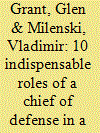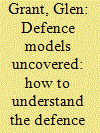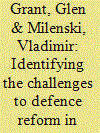| Srl | Item |
| 1 |
ID:
181993


|
|
|
|
|
| Summary/Abstract |
New democracies face significant difficulty in understanding the position of the Chief of Defense (CHOD) and its difference from the traditional/historical role of Chief of the General Staff (CGS). Many of those states attempted to transition from CGS to CHOD upon the advice from Western allies. This move usually followed critical failures in the defense systems. These failures often occurred after bad political decisions regarding the armed forces because the political leadership was in the dark about their true condition. The role of the CHOD, as envisaged and implemented in most long-standing democracies, is designed both to solve this deficiency and to ensure that the armed forces are fit for the future. This article outlines how and why this is the case and identifies precisely what it is that a CHOD should do.
|
|
|
|
|
|
|
|
|
|
|
|
|
|
|
|
| 2 |
ID:
164702


|
|
|
|
|
| Summary/Abstract |
This paper describes four different styles, or models, of defence organisation that can be found worldwide. The framework outlined in the paper has been designed to help politicians, diplomats and officials understand better their own system so they can improve it, or to understand the system of others so they can produce better interoperability. The four styles (or models) suggested are mutually exclusive as each has defining factors that mark them out from the other three. The models are rational focusing upon warfighting; emotional, the antithesis of rationality where choices of the day dominate; politically dominant, where a political solution is chosen for the country such as conscription; and militarily dominant, where the whole defence system is controlled by the military with no proper civilian oversight. Each model is hard to sustain and most countries tend towards one style being dominant with elements of the others.
|
|
|
|
|
|
|
|
|
|
|
|
|
|
|
|
| 3 |
ID:
161005


|
|
|
|
|
| Summary/Abstract |
The authors have over 50 years' experience of working on defence in Central and Eastern Europe. They have been intimately involved in trying to reform over 10 national defence organisations including Ukraine. During this work, they often faced intractable resistance and scepticism or conversely, apparent unbounded support, but following this, a complete lack of any actual implementation work by officials. This paper addresses some of the findings and observations identified by the authors that appear to cause these responses and the consequent failure of reform. A new research approach has been taken by using the business and culture tools from Schein, Hofstede and Kotter to try and unravel the underlying causality of that failure. The second part of the paper produces a new process for change based upon the research conclusions to help other advisers and consultants working on reform in the post communist defence arena.
|
|
|
|
|
|
|
|
|
|
|
|
|
|
|
|